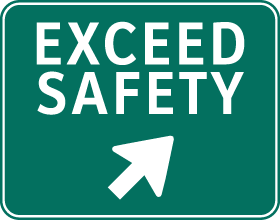Overview & Objectives
The Dibromochloropropane (DBCP) Awareness for General Industry from Exceed Safety is an introductory-level course that focuses on 1,2-Dibromo-3-Chloropropane – more commonly referred to as DBCP. This course provides an overview of DBCP as covered by Subpart Z 29 CFR 1910.1044 for General Industry. While once used as a soil fumigant and nematicide, a type of insecticide on crops, DBCP is primarily only used as an intermediate in chemical synthesis these days.
Exceed Safety’s DBCP Awareness for General Industry training discusses the common uses of DBCP, potential exposure, and its chemical properties. Designed to focus on health hazards and effects, participants will learn OSHA requirements and more. Specific course topics include the following:
- Introduction to DBCP
- Properties of DBCP
- DBCP exposure and associated health hazards
- Safety requirements of DBCP
- Symptoms of acute and chronic exposure
Specific industry terms covered throughout the course include the following:
- DBCP
- Soil fumigant
- Permissible exposure limit (PEL)
Who Is This Course For?
The DBCP Awareness for General Industry course is designed primarily for all workers and management in the General Industry. This course will specifically benefit the following:
- General industry workers
- General industry managers
- General industry supervisors
If you have any concerns as to whether this course is appropriate for you or your industry, please browse our full selection of Online Courses and Safety Packs, call 800-971-1080, or Contact Us online.
Features & Benefits
Exceed Safety’s DBCP Awareness for General Industry course introduces participants to DBCP and essential health and safety protocols as established by OSHA. Upon successful completion of this course, participants can expect to:
- Know the most common uses of DBCP
- Identify sources of potential exposure
- Know the chemical and physical properties of DBCP
- Know the hazards and health effects of DBCP
- Recognize the symptoms of acute and chronic exposure
- Know the primary routes of exposure
- Understand OSHA’s standards and how the apply to DBCP
- Know the PELs and recommended exposure controls


